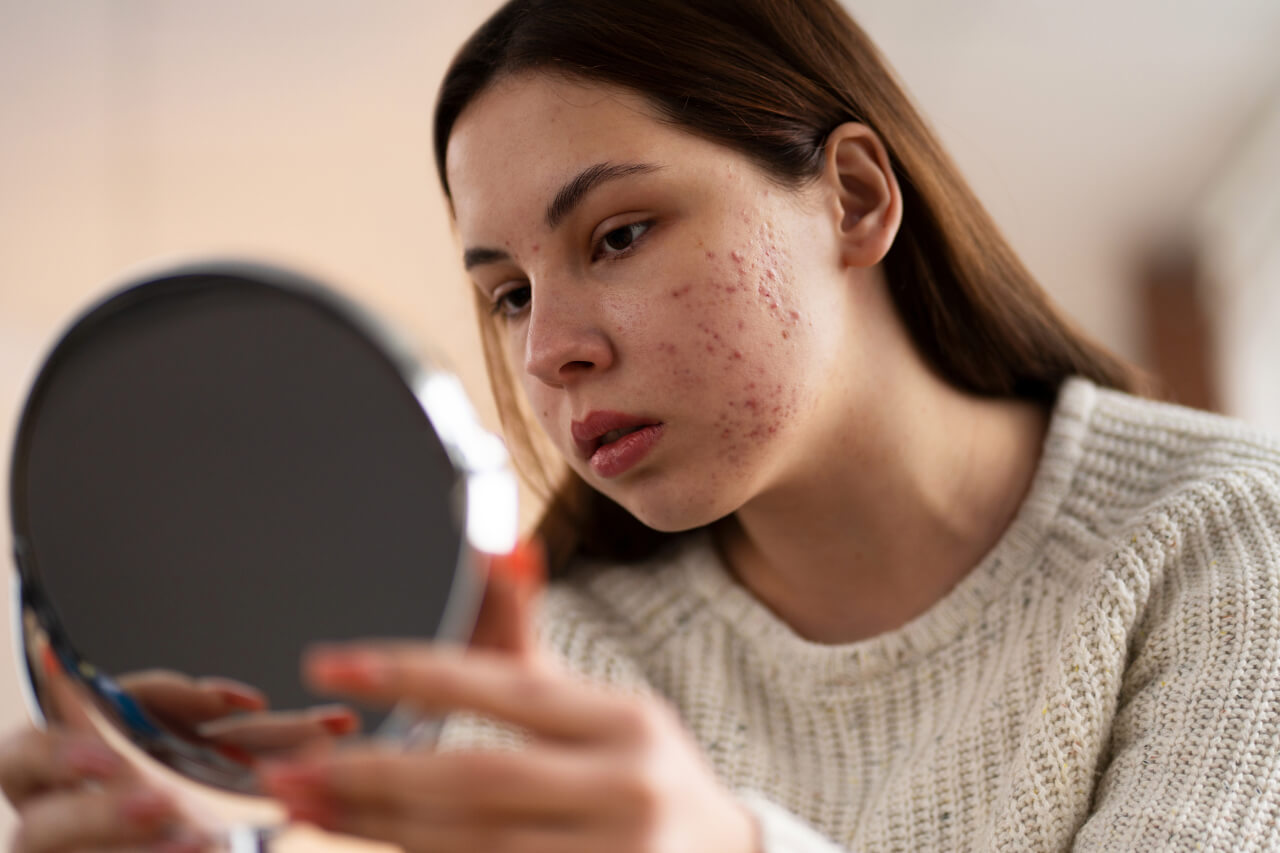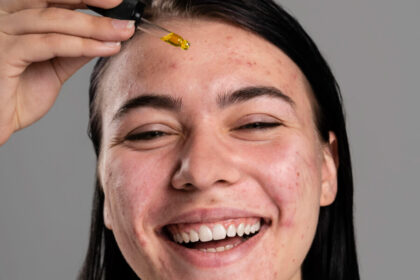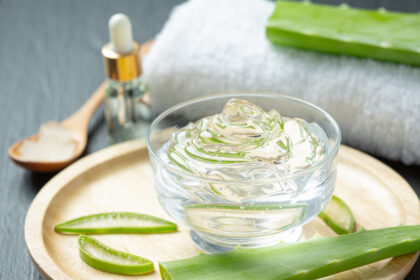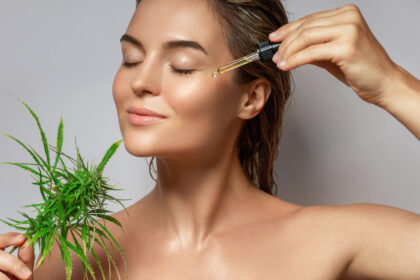Acne is a common skin condition that affects millions of people around the world.
It can cause pimples, blackheads, whiteheads, and cysts on the face, chest, back, and shoulders.
Acne can affect anyone, regardless of age, gender, or skin type.
However, some people may experience a specific type of acne that is linked to hormonal changes in the body.
This is called hormonal acne.
Hormonal acne is more prevalent in women than men, especially during puberty, menstruation, pregnancy, and menopause.
Hormonal acne can also affect people with certain medical conditions, such as polycystic ovary syndrome (PCOS), or those who use certain medications, such as steroids or birth control pills.
Hormonal acne can be frustrating and challenging to treat, but there are ways to manage it and prevent it from affecting your self-esteem and quality of life.
In this blog post, we will explain what hormonal acne is, what causes it, what it looks like, and how to treat it naturally and effectively.
We will also share some tips and recommendations on how to prevent hormonal acne and maintain healthy and clear skin.
What is hormonal acne and what causes it?
Hormonal acne is acne that is influenced by fluctuations in hormones, especially androgens.
Androgens are male sex hormones, such as testosterone and dihydrotestosterone (DHT), that are present in both men and women.
Androgens stimulate the production of sebum, which is the oily substance that lubricates and protects the skin.
Sebum is normally beneficial for the skin, but when it is produced in excess, it can clog the pores and trap dead skin cells and bacteria.
This can lead to inflammation, infection, and acne.
Hormonal acne can be triggered by various factors that affect the balance of hormones in the body, such as:
Puberty: During puberty, the levels of androgens increase in both boys and girls, causing the sebaceous glands to enlarge and produce more sebum.
This can result in acne, especially on the forehead, nose, and chin (the T-zone).
Menstruation: Before and during menstruation, the levels of estrogen and progesterone fluctuate, causing changes in the skin.
Estrogen is a female sex hormone that has anti-inflammatory and anti-acne effects, while progesterone is a female sex hormone that has pro-inflammatory and pro-acne effects.
When estrogen levels drop and progesterone levels rise, the skin becomes more prone to acne, especially on the lower part of the face, such as the jawline and chin.
Pregnancy: During pregnancy, the levels of estrogen and progesterone increase significantly, causing changes in the skin.
Some women may experience improved skin condition due to the anti-acne effects of estrogen, while others may experience worsened skin condition due to the pro-acne effects of progesterone.
Hormonal acne during pregnancy can occur at any time, but it is more common during the first and third trimesters.
Menopause: During menopause, the levels of estrogen and progesterone decline gradually, causing changes in the skin.
The skin becomes thinner, drier, and more sensitive, and the sebaceous glands become more responsive to androgens.
Hormonal acne during menopause can occur on the lower part of the face, such as the jawline and chin, as well as on the neck, chest, and back.
Polycystic ovary syndrome (PCOS): PCOS is a hormonal disorder that affects women of reproductive age.
It is characterized by irregular or absent periods, excess androgen levels, and multiple cysts on the ovaries.
PCOS can cause various symptoms, such as weight gain, hair growth, infertility, and acne.
Hormonal acne due to PCOS can occur on the lower part of the face, such as the jawline and chin, as well as on the neck, chest, and back.
Medications: Some medications can affect the balance of hormones in the body and cause acne as a side effect.
These include steroids, birth control pills, hormone replacement therapy, and some antidepressants.
Hormonal acne due to medications can occur on any part of the face or body, depending on the type and dose of the medication.
What does hormonal acne look like and how to identify it?
Hormonal acne can look different from person to person, depending on the severity, location, and type of the acne lesions.
However, some common characteristics of hormonal acne are:
It occurs on the lower part of the face, such as the jawline and chin, and sometimes on the neck, chest, and back.
It consists of inflamed and painful bumps that are deep under the skin and do not come to a head easily.
These are called cysts or nodules, and they can leave scars or dark spots on the skin.
It flares up or worsens around certain times of the month, such as before or during menstruation, or during ovulation.
It does not respond well to over-the-counter acne treatments, such as benzoyl peroxide or salicylic acid.
If you suspect that you have hormonal acne, you should consult a dermatologist or a healthcare provider for a proper diagnosis and treatment.
They can perform a physical examination of your skin, ask you about your medical history, menstrual cycle, medications, and lifestyle, and order some blood tests to check your hormone levels and rule out any underlying conditions.
How to treat hormonal acne naturally and effectively?
Hormonal acne can be challenging to treat, but there are some natural and effective ways to manage it and prevent it from affecting your self-esteem and quality of life.
Here are some of the best natural treatments for hormonal acne, based on scientific research and personal experience:
1. Use gentle and natural skin care products
One of the most important steps to treat hormonal acne is to use gentle and natural skin care products that are suitable for your skin type and condition.
You should avoid harsh, exfoliating, or drying products that can irritate your skin and worsen your acne.
You should also avoid products that contain comedogenic or pore-clogging ingredients, such as mineral oil, lanolin, or cocoa butter.
Instead, you should look for products that contain natural and non-comedogenic ingredients, such as:
Salicylic acid: Salicylic acid is a natural ingredient derived from the willow tree.
It is a type of beta-hydroxy acid (BHA) that can penetrate deep into the pores and dissolve the excess sebum, dead skin cells, and bacteria that cause acne.
Salicylic acid can also reduce inflammation, redness, and swelling of the acne lesions.
You can use salicylic acid in the form of a cleanser, toner, lotion, or spot treatment, depending on your preference and needs.
However, you should start with a low concentration (2% or less) and use it sparingly (once or twice a day) to avoid irritation or dryness.
Tea tree oil: Tea tree oil is a natural ingredient derived from the leaves of the Melaleuca alternifolia plant. It is a type of essential oil that has antibacterial, anti-inflammatory, and antiseptic properties. Tea tree oil can kill the acne-causing bacteria, reduce the inflammation and infection of the acne lesions, and prevent new breakouts from forming.
You can use tea tree oil in the form of a diluted oil, gel, cream, or mask, depending on your preference and needs.
However, you should never apply pure tea tree oil directly to your skin, as it can cause irritation or allergic reactions.
You should always dilute it with a carrier oil, such as jojoba oil, almond oil, or coconut oil, and do a patch test before using it on your face.
Green tea extract: Green tea extract is a natural ingredient derived from the leaves of the Camellia sinensis plant.
It is a type of antioxidant that can protect the skin from free radical damage, inflammation, and aging.
Green tea extract can also reduce the production of sebum, the activity of the acne-causing bacteria, and the severity of the acne lesions.
You can use green tea extract in the form of a lotion, cream, serum, or mask, depending on your preference and needs.
However, you should look for products that contain at least 2% of green tea extract to get the best results.
2. Take natural supplements
Another way to treat hormonal acne is to take natural supplements that can balance your hormones, improve your skin health, and prevent acne from the inside out.
Some of the best natural supplements for hormonal acne are:
DIM (diindolylmethane): DIM is a natural compound derived from cruciferous vegetables, such as broccoli, cauliflower, cabbage, and kale.
It is a type of phytoestrogen that can modulate the metabolism and action of estrogen in the body.
DIM can help balance the ratio of estrogen to progesterone, reduce the excess androgens, and regulate the menstrual cycle.
DIM can also reduce the inflammation, oxidative stress, and sebum production that contribute to acne.
You can take DIM in the form of a capsule, tablet, or powder, depending on your preference and needs.
However, you should consult your doctor before taking DIM, especially if you have any medical conditions or take any medications.
You should also start with a low dose (100 mg or less) and increase it gradually until you find the optimal dose for you.
Zinc: Zinc is a natural mineral that is essential for your immune system, wound healing, and skin health.
Zinc can help reduce the inflammation, infection, and scarring of the acne lesions.
Zinc can also inhibit the activity of the enzyme 5-alpha-reductase, which converts testosterone to DHT, the more potent and acne-causing form of androgen.
You can take zinc in the form of a capsule, tablet, or lozenge, depending on your preference and needs.
However, you should consult your doctor before taking zinc, especially if you have any medical conditions or take any medications.
You should also avoid taking more than 40 mg of zinc per day, as it can cause side effects, such as nausea, vomiting, and diarrhea.
Omega-3 fatty acids: Omega-3 fatty acids are natural compounds that are found in fish, flaxseeds, walnuts, and other sources.
They are a type of polyunsaturated fat that can benefit your cardiovascular, brain, and skin health.
Omega-3 fatty acids can help reduce the inflammation, oxidative stress, and sebum production that contribute to acne.
Omega-3 fatty acids can also balance the ratio of omega-3 to omega-6 fatty acids, which are another type of polyunsaturated fat that can promote inflammation and acne.
You can take omega-3 fatty acids in the form of a capsule, liquid, or powder, depending on your preference and needs.
However, you should consult your doctor before taking omega-3 fatty acids, especially if you have any medical conditions or take any medications.
You should also look for products that contain at least 500 mg of EPA and DHA, which are the most active and beneficial forms of omega-3 fatty acids.
Vitex: Vitex is a natural herb that is also known as chasteberry or monk’s pepper. It is a type of phytoestrogen that can modulate the production and action of progesterone in the body.
Vitex can help balance the ratio of estrogen to progesterone, reduce the excess androgens, and regulate the menstrual cycle.
Vitex can also reduce the symptoms of premenstrual syndrome (PMS), such as mood swings, bloating, and acne.
You can take vitex in the form of a capsule, tablet, or tincture, depending on your preference and needs.
However, you should consult your doctor before taking vitex, especially if you have any medical conditions or take any medications.
You should also avoid taking vitex if you are pregnant, breastfeeding, or using hormonal contraceptives.
Adopt a healthy lifestyle
The last but not least way to treat hormonal acne is to adopt a healthy lifestyle that can support your overall health and wellbeing.
Some of the aspects of a healthy lifestyle that can help you prevent and manage hormonal acne are:
Diet: Diet can have a significant impact on your skin condition and hormone balance.
You should avoid foods that can trigger or worsen your acne, such as dairy, sugar, refined carbs, and processed foods.
You should also eat foods that can benefit your skin and hormone health, such as fruits, vegetables, whole grains, lean protein, healthy fats, and probiotics.
Exercise: Exercise can help you reduce stress, improve blood circulation, and regulate your hormones. Exercise can also help you sweat out toxins, impurities, and excess sebum from your skin.
You should exercise regularly, at least 30 minutes a day, three times a week, and choose an activity that you enjoy and suits your fitness level, such as walking, jogging, cycling, or swimming.
Sleep: Sleep can help you restore and rejuvenate your body and mind, and regulate your hormones. Sleep can also help you reduce inflammation, oxidative stress, and sebum production that contribute to acne.
You should get enough sleep, at least seven to eight hours a night, and follow a regular sleep schedule.
You should also avoid caffeine, alcohol, and electronics before bed, and create a comfortable and dark sleeping environment.
Stress management: Stress can affect your hormone levels, immune system, and skin health.
Stress can also trigger or worsen your acne, especially if you tend to pick or squeeze your pimples when you are stressed.
You should manage your stress levels, and find healthy and positive ways to cope with stress, such as meditation, yoga, breathing exercises, hobbies, or social support.
You can find Top-Inflammation Foods that will help your Mental Health here
Conclusion
Hormonal acne is a common and frustrating skin condition that affects many people, especially women.
It is caused by fluctuations in hormones, especially androgens, that stimulate the production of sebum and cause inflammation and infection of the pores.
Hormonal acne can be triggered by various factors, such as puberty, menstruation, pregnancy, menopause, PCOS, or medications.
Hormonal acne can look different from person to person, but it usually occurs on the lower part of the face, such as the jawline and chin, and consists of inflamed and painful bumps that are deep under the skin and do not come to a head easily.
Hormonal acne can be challenging to treat, but there are some natural and effective ways to manage it and prevent it from affecting your self-esteem and quality of life.
FAQs
What exactly is hormonal acne, and how does it differ from other types of acne?
Hormonal acne is linked to fluctuations in the body’s hormones, primarily affecting women during events such as puberty, menstruation, pregnancy, and menopause.
It is distinguished by its association with hormonal changes.
What are the characteristic symptoms of hormonal acne?
Hormonal acne manifests symptoms such as pimples, blackheads, whiteheads, and cysts, typically in areas like the jaw, chin, and neck.
These symptoms can vary depending on hormonal stages.
Who is more prone to developing hormonal acne?
Women, especially during key hormonal cycle events like menstruation, pregnancy, or menopause, are more susceptible to hormonal acne.
It can also affect individuals with medical conditions like polycystic ovary syndrome (PCOS) or those taking certain medications.
How can hormonal acne be treated naturally?
In addition to medical options, natural approaches like dietary changes, stress management techniques, and natural skincare products can be employed.
These methods may help balance hormones and reduce breakouts.
Are there factors that can worsen hormonal acne?
Yes, certain factors can exacerbate hormonal acne, such as stress, an unhealthy diet, and the use of skincare products containing irritating ingredients.
Identifying and addressing these factors can contribute to improvement.
When should one consider seeking professional help for hormonal acne?
If hormonal acne significantly impacts quality of life or if at-home treatment methods prove ineffective, it is advisable to seek the assistance of a dermatologist or other healthcare professionals. They can provide more specialized treatment options.





